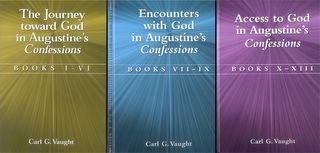
Three-volume Easter journey with St. Augustine finds riches in 'Confessions'
By DAN BARNETT
The 13 chapters (or books) of Augustine's "Confessions," written in 397-400, continue to enthrall and challenge readers. Augustine had just become Bishop of Hippo (a name that means "seaport") in North Africa, but the document he produced is no dry ecclesiastical pronouncement. Instead, in the intimate language, he pours his heart out to God and to his readers and confesses that even as a man of faith he still seeks understanding.
As Christians celebrate Jesus' resurrection, it is well to remember that Augustine's story of his own Easter faith is full of surprises. Augustine is convinced that God was at work in his life even, when as a young man, he turned away from the family faith to pursue a career as a teacher of rhetoric and to satisfy his own sexual desires. His mother Monica's fervent prayers were eventually answered.
There are many translations of the "Confessions"; one recent and clear one is from Henry Chadwick ($7.95 in paperback from Oxford World's Classics). But while the first nine books recount Augustine's experience in becoming a believer, the 10th book, on memory, turns to Augustine's present philosophical concerns. The last three books deal with questions of time and eternity, creation and redemption, and how the earthly world connects with the heavenly realms. For many readers it is not easy going.
Those wishing a careful and scholarly guide through the "Confessions" will be delighted with the three-volume work of Carl G. Vaught, distinguished professor of philosophy at Baylor University. He writes that the books of the "Confessions" show a carefully structured thematic unity, which is portrayed in the titles of Vaught's trilogy, all published by the State University of New York Press: "The Journey Toward God in Augustine's Confessions (Books I-VI)" ($17.95 in paperback); "Encounters With God in Augustine's Confessions (Books VII-IX)" ($35 in hardcover); and "Access To God in Augustine's Confessions (Books X-XIII)" ($65 in hardcover). These books form a section-by-section commentary on Augustine's great work.
Vaught begins, as Augustine does, by asking lots of questions: "How shall we respond to a book as rich and complex as this? What approach should we take?" Vaught writes that though "Augustine speaks as a psychologist, a rhetorician, a philosopher and a theologian ... he speaks most fundamentally from the heart."
In order to best understand the "Confessions," Vaught writes, readers need to be aware of the time, space and eternal dimensions of the story. Regarding time, Augustine recounts his theft of pears when he was 16, his interest in philosophical wisdom and his being led astray by the Manichees (a sect that believed good and evil were locked in eternal battle). Spatially, Augustine's story deals not only with his outside world (the African church, the temptations of Italy) but the inside world of his own soul, the place he encounters God (though God is much greater than the soul and is its creator). The eternal dimension is about how God manifests himself in the created order, through memory and time and the sacraments, enabling Augustine to encounter the one who "made us for yourself"; and Augustine adds: "Our heart is restless until it rests in you."
Vaught's books provide the reader with an understanding of that rest.
Dan Barnett teaches philosophy at Butte College. To submit review copies of published books, please send e-mail to dbarnett@maxinet.com. Copyright 2006 Chico Enterprise-Record. Used by permission.
No comments:
Post a Comment